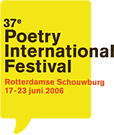Poet
|
Amjad Nasser 1955-... country: Jordania language: Arabic |
belongs to a group of experimental poets exploring the boundaries of modern Arabic poetry. Since 1976 he has worked as a journalist for several newspapers. Currently he is culture editor of the London-based Arabic newspaper Al-Quds Al-Arabi. Nasser has published nine volumes of poetry and a book of travel essays. His poems have appeared in French and Italian translations. The poet Amjad Nasser was born in Turra in northern Jordan in 1955, and has been living in London since 1987. He works for the Arabic daily Al-Quds al-Arabi, which he co-founded. Under his direction the daily’s cultural supplement grew to become a major forum for modern Arabic literature. He earlier worked as a producer for Jordanian television and as a journalist in Jordan, Lebanon and Cyprus. In his poetry, Nasser combines avant-garde modernity with a fertile bond with Arab tradition and the reflection of the paradoxes of life, especially his own life as an exile in a city ironically connected with the theme of Arab dreams and defeats. As typical influences on his work he mentions free verse and the prose poem of three leading exponents of this innovation in Arabic poetry (the Lebanese poet Unsi al-Hajj, the Syrian Muhammad al-Maghût and the Syrian-Lebanese poet Adonis) and the aesthetics of the Iraqi poet Saadi Yûsuf. Due to the powerful influence of a glorious tradition of fifteen centuries of metrical poetry with fixed line lengths and monorhyme, the success of prose poetry was not a matter of course, and apologetic behaviour on the part of its pioneers was only to be expected. Amjad Nasser is seen as one of the foremost representatives of the second generation, for whom the legitimacy of the new forms is beyond question. His collected verse (six volumes) was published in Beirut in 2002. He also published two collections of travel stories: Khabt al-Ajniha (Wingbeats), London 1996, and Taht Akthar min Samâ’ (Under More Than One Sky), Beiroet 2002. Author: Willem Stoetzer Translated by Ko Kooman Poets: |


